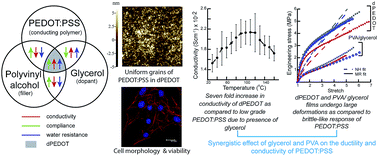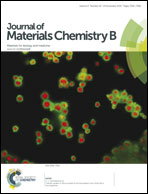Fabrication of a novel biomaterial with enhanced mechanical and conducting properties
Abstract
Conducting polymers have the combined advantages of metal conductivity with ease in processing and biocompatibility; making them extremely versatile for biosensor and tissue engineering applications. However, the inherent brittle property of conducting polymers limits their direct use in such applications which generally warrant soft and flexible material responses. Addition of fillers increases the material compliance, but is achieved at the cost of reduced electrical conductivity. To retain suitable conductivity without compromising the mechanical properties, we fabricate an electroactive blend (dPEDOT) using low grade PEDOT:PSS as the base conducting polymer with polyvinyl alcohol as filler and glycerol as a dopant. Bulk dPEDOT films show a thermally stable response till 110 °C with over seven fold increase in room temperature conductivity as compared to 0.002 S cm−1 for pristine PEDOT:PSS. We characterize the nonlinear stress–strain response of dPEDOT, well described using a Mooney–Rivlin hyperelastic model, and report elastomer-like moduli with ductility ∼ fives times its original length. Dynamic mechanical analysis shows constant storage moduli over a large range of frequencies with corresponding linear increase in tan(δ). We relate the enhanced performance of dPEDOT with the underlying structural constituents using FTIR and AFM microscopy. These data demonstrate specific interactions between individual components of dPEDOT, and their effect on surface topography and material properties. Finally, we show biocompatibility of dPEDOT using fibroblasts that have comparable cell morphologies and viability as the control, which make dPEDOT attractive as a biomaterial.


 Please wait while we load your content...
Please wait while we load your content...